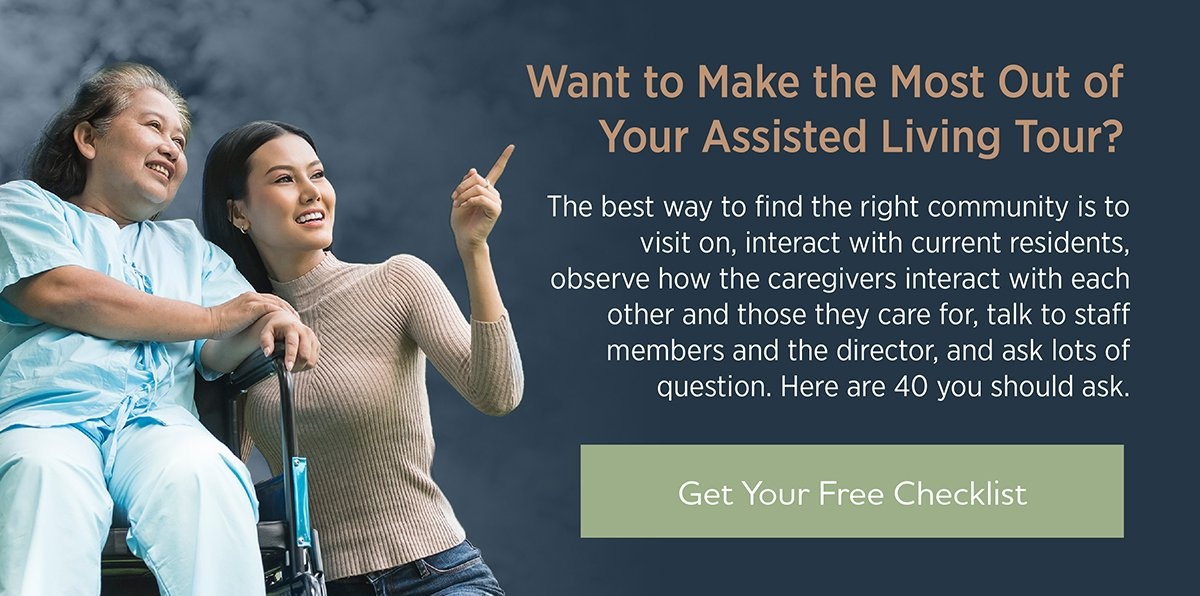
The need for seniors to live in a safe environment and to stay connected with the world around them doesn’t go away just because there’s a global pandemic. That’s why Highgate is offering virtual tours of its senior living communities.
“Seniors are feeling the isolation at home more because families are afraid to visit and friends are not stopping by to check in or say hi,” says Shelley Phoenix, Director of Sales at Highgate Senior Living. “They are not getting out to buy groceries but instead ordering to be delivered. This isolation is causing increased depression and anxiety for the uncertain future. At Highgate, we are business as usual.”
Senior Living in the Time of Coronavirus
Worried that your loved one will be more isolated in a community setting than at home? Not at Highgate.
At Highgate at Yakima, family members visit loved ones from a safe distance in the gazebo. Tanya at the front desk greets everyone with a smile — “Even though you can’t see it!” In the assisted living side of the community, called the Manor, residents wear masks and stand 6 feet apart from one another while doing arm-strengthening exercises. In the Cottage, the memory care neighborhood, a team member curls one resident’s hair while another gives a resident a manicure.
“Because we are medically trained, we can see the signs of a UTI, a stroke, a heart attack,” says Mandy Ketcham, Community Relations Coordinator at Highgate at Yakima. “If someone has congestive heart failure, we’re weighing them. We can see if they’ve gained 2 pounds or if they’re breathing a little differently than normal. We can see those beginning signs because we have Preferred Care Partners and safety measures in place, and then we can be proactive.”
Adds Tracy Pagel, Community Relations Coordinator at Highgate at Wenatchee: “When community primary care physicians come to Highgate to see our residents, they say their patients who live at home are failing. They’re failing because they’re not going to the store and getting food and nutrition they need. They’re sitting in their chairs, watching TV, worried at home. They can’t see families on a regular basis. They’re confused. They decline so quickly without that. When you have providers tell you that, you know it’s happening.”
How Virtual Senior Living Tours Work
Although many Highgate communities aren’t accepting outside visitors, families can visit virtually or get face-to-face time by a window, and activities are still happening with good social distancing. And if you want to “see” it all for yourself, you can.
“Innovation is going on,” Phoenix says. “We have adapted to provide a good quality visit with our sales team to ensure that you are making a smart decision when choosing an assisted or memory care move.”
Each Highgate community takes into consideration specific protocols provided by federal, state, and local guidelines to prevent the spread of coronavirus. Tour options include:
- Live virtual tours: Whether you have FaceTime, Facebook Messenger, Zoom, Skype, House Party, or WhatsApp, you can see communities in real time and have a live conversation with a Highgate team member.
- Pre-recorded tours: Want to watch when it’s convenient for you? Highgate team members offer pre-recorded tours of accommodations, grounds, meals, and activities via the OneDay video app.
- In-person meetings: All communities have set up large tents with comfortable seating (at the appropriate distance) outside. After getting to know a little more about your situation, team members walk you to a model room. Some communities have access from the patio to enter the model room while others may view from a window.
“This is a great time to be exploring your senior living options because we are better than home for many seniors,” Phoenix says.
If you are considering senior living for yourself or a loved one, here are six tips for making the most of your virtual tour.
1. Have an Open Mind
Coronavirus has changed life as we know it. Things are different right now, and this is new territory for everyone.
Fortunately, Highgate is constantly looking for new and better ways to help its residents, run its communities, and stay on the cutting edge of senior care. Leaders in the senior living industry, Highgate is innovating to give touring families the best experience possible, and it helps to have an open mind.
“It is really important to be as transparent as possible,” Ketcham says. “Highgate is good at that anyway, but when families can’t physically touch things, they feel that maybe they’re not going to get the full experience. So let us be your hands. You can still have the same experience, but we’ll open the doors and pull back the curtains.”
Another example: “Our dining room isn’t up and running, but it’s set up. Families can see that we’re actively trying to get to that next phase of re-opening. We’re not stagnant. We’re doing what is best for the residents while cautiously moving forward. We’re getting the dining room ready so we can reopen safely. We put the tables 6 feet apart. Families can see what we’ve done and what we’re continuing to do.”
2. Involve Your Loved One
The more involved your parent is in the search, the better. Of course, you can do much of the legwork, but have meaningful discussions with your parent about their preferences and desires and allow them to participate in the virtual tour experience.
“If Mom or Dad are asking for a move-in, the family should listen,” Phoenix says. “There's something they’re missing —socialization, good food, exercise. Focus on your parent’s wants and needs.”
If your parent is resistant or has a hard time processing new information, consider narrowing down your options first and then bringing them in for a tour.
“We give out so much information and answer a lot of questions,” Ketcham says. “That can be too much for prospects sometimes. If you’re a family caregiver, do the initial tour on your own. If you think Mom will like it, then we’ll start planning her tour, and I’ll show her the most important things so it’s not overwhelming.”
3. Ask for Accommodations
If your loved one wants to be involved in the process but has a hard time hearing, ask for accommodations.
For example, at Highgate at Yakima, Ketcham recently took a family on a virtual tour via FaceTime and a CaptionCall phone. That way the prospective resident could see the community via the FaceTime video and reading captions of what Ketcham was saying via the captioned telephone app.
Highgate communities also use Eversound headphones to help seniors hear better.
4. Write Your Questions Down
You probably have a hundred important questions about each community you visit. Once you are there, however, you will probably forget at least a dozen of them. That is why Ketcham recommends writing down your questions in advance. A lot of families find it helpful to write down a list of questions and concerns beforehand so they do not forget to ask about transportation services or pet fees in the heat of the moment.
“Even if you think it’s not a big question, most likely you’ll forget it because we go over so much information,” she says.
5. Be Prepared to Answer Some Questions, Too
If your in-person or virtual visit doesn’t begin with several questions about your family, your loved one, and the type of community you are looking for, be cautious that the community isn’t truly focused on your needs, wants, and desires but instead is more focused on showcasing what they have to offer.
“I always ask what prompted the call,” Ketcham says. “If Mom isn’t taking her meds properly, we’ll talk with our med assistant. If Dad has Parkinson’s, we’ll talk with our nurse. If Mom has diabetes, we’ll meet with the chef. If Dad needs socialization, I’ll connect with our Life Enhancement Coordinator to talk about our Pick a Purpose sheet.”
6. Bring in the Professionals
Sometimes it’s easier for a parent to talk to a professional rather than their son or daughter, and they might be more willing to listen to the advice of a doctor, lawyer, care manager, or an assisted living counselor about the importance of getting the support they need while they are still very capable of making that decision.
“Tonight I’m doing a Zoom call with the family, the doctor, and a life care coach they hired to get through the transition,” Pagel says.
In the age of COVID-19, transitions can certainly be challenging to navigate, and it may take time to make sure your loved one is comfortable with a community before making a decision. But it is much more likely to be the best decision.
To help you compare communities and decide on the community that is right for your loved one, check out our checklist of questions to ask when touring an assisted living community.
*Each Highgate community takes into consideration specific protocols provided by federal, state, and local guidelines to prevent the spread of coronavirus, and guidelines are changing regularly as needs arise. Your local Highgate community might be implementing different protocols than the Highgate communities referenced in this piece, and information stated here may have evolved. Please contact your community directly for more information.






